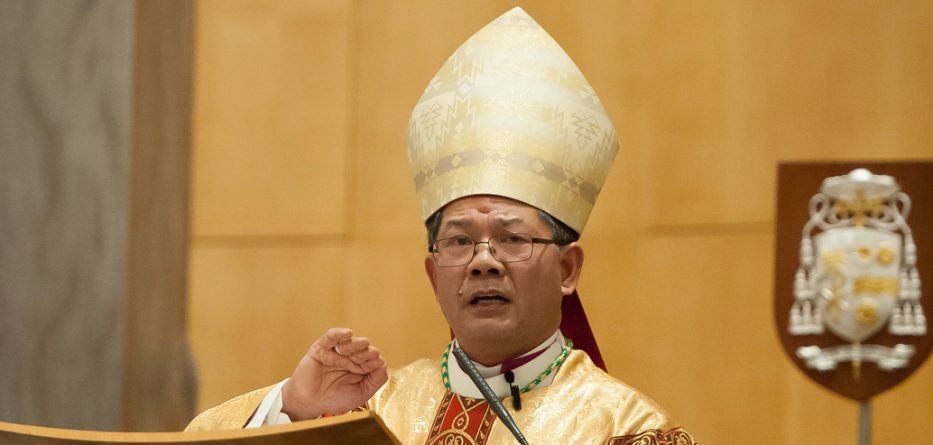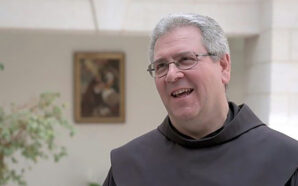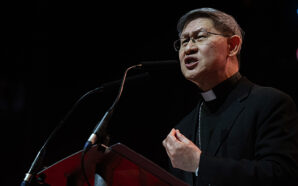Most Reverend Vincent Long Van Nguyen OFM Conv DD STL, Bishop of Parramatta
Homily for the Solemnity of the Most Holy Body and Blood of Christ (Corpus Christi) in Year A 2017
18 June 2017
Dear Friends,
On Friday night, I was invited to a celebration of Iftar which is a gathering to mark the end of Ramadan daily fast. It was the first time that I sat at table with so many Moslem sheikhs and imams. My initial feeling of unfamiliarity quickly gave way to a genuine sense of fellowship. It is amazing how the hospitality of food and drink can bring us all together. I felt the presence of God among my Moslem brothers and sisters. He comes to us in the form of food, shared with a sense of common humanity, gratitude and joy. I felt the force of Jesus’ example of going beyond my tribal identity and reaching out to those who are different. I came home enriched by the experience of the otherness of God that stretches the limits of who I am.
Today, we are celebrating the feast of Corpus Christi. I have childhood memories associated with this feast, such as street processions with the monstrance, long adoration sessions and other festivities. There was a sense of a tribal Catholic identity, which was reinforced by these celebrations. We were told that we had the real presence and that only Catholics could go to heaven because of it. It never occurred to us that such an attitude might smack of superiority and righteousness, which is the very attitude that Jesus condemned the Pharisees for.
Scriptures for this feast help us to appreciate the gift of the Eucharist and live it out in the way that truly transforms us. Moses in the book of Deuteronomy interprets for the people the meaning of their experience in the wilderness. “God humbled you, made you feel hunger and then fed you with manna… in order to make you understand that man does not live on bread alone but on God’s word.” In other words, the exodus was not simply a physical journey into the promise land. It was a journey that was meant to transform them into God’s faithful people. Exodus was a journey into authentic discipleship. In the light of this, manna was not so much a magic food as a gift that empowered them to journey into transformation, both individually and collectively. Their liberation from slavery in Egypt can only be true freedom when the reign of God’s justice is made evident in their lives and relationships.
In the Gospel, Jesus also speaks of transformation by means of the gift of himself. He declares that he is the new Manna that nourishes and gives the fullness of life. “I am the living bread come down from heaven. Anyone who eats this bread will live forever; and the bread that I shall give is my flesh for the life of the world”. Jesus is not speaking of cannibalism, of course. Rather, the flesh he is speaking of refers to the offering of himself on the altar of the cross. Thus, Jesus links what happened in the past with what he would accomplish on Calvary. Manna in the desert foreshadows the real food of life that Jesus would give to us at the table of the Eucharist. Manna was food for the exodus from slavery; but Jesus is the food for the new exodus into freedom, liberation and wholeness.
Dear friends,
There is a real sense that as a people of God, we are also going through a deep, alien and barren desert. The words of Moses are particularly poignant to us. God has humbled us as Church. We feel a deep sense of humiliation and loss in the wake of the Royal Commission. If we were to ask “what is the purpose of this humiliation?”, then perhaps Moses’ explanation is still relevant to us. That is, we must empty ourselves of all the things that keep us from hungering for God alone. We must be willing to rid ourselves of things that are the Gospel. We need to convert to the humble and servant Christ, one who came not be served but to serve and to give his life for all.
The history of imperial Christendom has shown that power, dominance, privilege, control and clericalism has characterised our attitudes and practices more than service, self-sacrifice, vulnerability and powerlessness of the humble Servant. In celebrating the feast of Corpus Christi today, we are called to become the body broken and the blood shed for the life of the world just as Jesus himself was. Corpus Christi is not about our superiority and specialness. That is at best a tribal mentality and at worst a travesty of our Christian vision. Pope Francis rightly reminds us that the Eucharist is not a prize for the perfect. Corpus Christi is to become what we eat, to be another Christ for the world, to be Eucharistic in our self-giving love, in our reaching out and in our embrace of all people in the manner Jesus showed us.
Thus Corpus Christi touches the very essence of our faith. Today, we give thanks for this gift of Christ’ body and blood. More importantly, we strive to imitate the self-giving nature of our God himself. As we celebrate and consume the Eucharist, let us commit ourselves to the journey of transformation. May we grow daily into the Eucharistic Christ who reaches out to all people and who gives himself fully for the life of the world.








